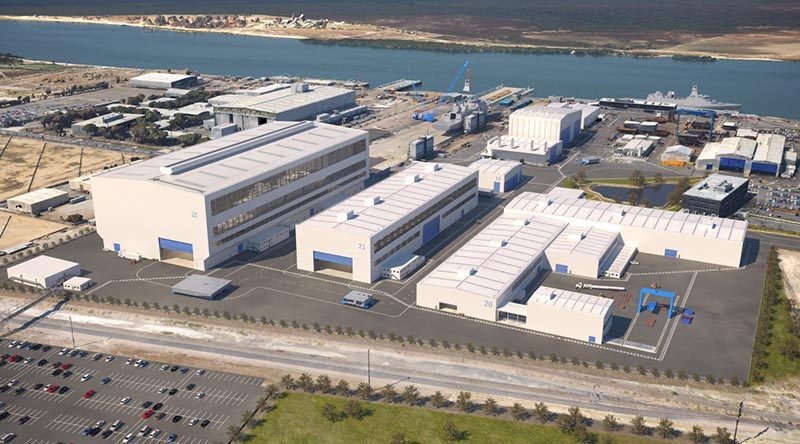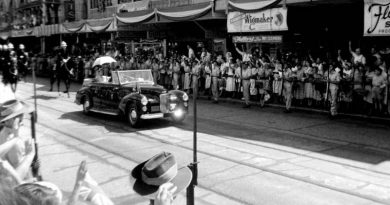When minister thinks she done good on radio

Minister for Defence Industry Melissa Price did a series of radio interviews this morning, trying to gee up the idea that some ex-Holden workers in Melbourne might well be suited to a skills transfer to the shipbuilding sector in Adelaide.
FILE IMAGE: Artist impression of the Osborne South Naval Shipbuilding Precinct. Defence image.
Minister Price was so pleased with her performance on radio, and so sure her message came across clearly and effectively, she published transcripts from two radio interviews in South Australia, so that we might all hear her message.
You be the judge of her performance…
MELISSA PRICE MP
Minister for Defence Industry
TRANSCRIPT
MORNINGS WITH DAVID BEVAN
ABC ADELAIDE
Subjects: Attracting automotive workers to the defence industry, submarine maintenance jobs
E&OE……..
DAVID BEVAN: Melissa Price is the Defence Industry Minister. She joins us now. Good morning Melissa Price.
MELISSA PRICE: Good morning, David.
DAVID BEVAN: You’re spruiking subs jobs in Adelaide for ex Holden engineers, is that right?
MELISSA PRICE: That’s right. That’s right, and it’s something that we identified as a government in our 2017 Naval Shipbuilding Plan. We identified that existing automotive workers, especially those engineering professionals and trade workers, we identified that they were potential sources of recruitment to the defence industry work. And I think if we have a look at it, those people that are going to be without a job at Holden, there’s approximately 240 engineering staff and around 130 design professionals. And, you know, we know that the majority of the engineering workforce, they’re split been mechanical and electrical, whereas the design workforce will include industrial designers and people that are proficient in computer-aided 3D, etcetera, etcetera.
So, you know, I think that there are certainly opportunities for those Holden workers. And maybe some of them will need, potentially, a bridging or a conversion course. But, you know, when you’ve got an ambitious shipbuilding program like our government has and we’ve only got at the moment around 4000 – 4000 people working in shipbuilding, we need that to increase to 15,000, I’m going to look everywhere I can to find those… [interrupted]
DAVID BEVAN: Has the Naval Group who are going to build these subs, have they told you that the engineers at Holden who have been based in Melbourne, that – they still kept their jobs long after the factory was closed here in Adelaide – those jobs in Melbourne, that they’re qualified to work on a sub?
MELISSA PRICE: The work that we’re doing, together with the Naval Shipbuilding College, the Land Engineering Agency and together with General Motors – we need to obviously do a piece of work where we map the skills and experience of the Holden workforce. But, you know, we have to keep talking about where is the skill set. As I said, we’ve only got 4000, we need 15,000. So, as Defence Industries Minister, I’m very focused on where are we going to get that skilled workforce from. And as I said at the outset, I’m not suggesting every single one of those Holden workers is going to be suitable but I guarantee you there’ll be some there that, you know, perhaps with just a small bridging course would actually be capable of working on our very ambitious subs program. But also don’t forget we’re also building nine frigates in South Australia as well.
DAVID BEVAN: Those Holden engineer jobs, they finish up what, is it the middle of this year?
MELISSA PRICE: Um, yes – yeah a little bit later than that.
DAVID BEVAN: A little bit later.
MELISSA PRICE: Yes.
DAVID BEVAN: When will they be needed in Adelaide?
MELISSA PRICE: Well, some of them, like the engineering and the design professionals, they could be needed within the next 12 months or even earlier. But, I mean, I’m guessing at the moment because I think we need to do that mapping exercise and obviously once the mapping exercise has been done, clearly we have to be talking to Naval Group as well.
DAVID BEVAN: Right. So we don’t really know whether they would be suitable or not, it’s just you saying “Oh, they might be”?
MELISSA PRICE: Well, as I said from the outset, under our 2017 Naval Shipbuilding Plan we identified that existing automotive workers, especially those engineering professionals and also some of the trade workers – boilermakers, for example – that they were potentially going to be recruited into the defence industry sector, so we identified that. I guess what we’re saying is we’ve now got 240 engineering staff and 130 design professionals at Holden, maybe they could form part of our ambitious shipbuilding program.
DAVID BEVAN: Do you think the WA Government has made a good case for it to take the sub maintenance jobs?
MELISSA PRICE: Well, as you know, David, the issues relating to full cycle docking are yet to be considered and Linda Reynolds, who is the Defence Minister, she is the responsible Minister for that.
DAVID BEVAN: Yeah, but I’m not asking you what the decision is, I’m just saying as an MP from WA, you’d be – and you’re the Defence Industry Minister, so you’d be right across what they’re spruiking. Do you think they’ve made a good case?
MELISSA PRICE: Oh I think both States have capability and that they’ve both put their credentials forward.
DAVID BEVAN: But did you sit back and see their ad or maybe you’ve read their glossy brochures and think, “Gee, these people, they could do it.”
MELISSA PRICE: Well, yeah, as I said, you know, these are decisions that need to be taken, and it’s not my responsibility, it’s the Minister for Defence who has that responsibility.
DAVID BEVAN: Yeah, but as a WA MP and Defence Industry Minister, do you think the WA Government has at least made out a case for taking those jobs?
MELISSA PRICE: Well, as I said, I think both States who are involved in shipbuilding for our nation, South Australia and Western Australia, have both worked hard at identifying their capability, and obviously there’s significant work going on in South Australia and there’s obviously significant work going on in Western Australia as well. Civmec, for example, has built the biggest shed in the southern hemisphere down at Henderson. So, there’s significant work going on at both those shipyards.
DAVID BEVAN: When will the decision be made?
MELISSA PRICE: It’s not my call. As I’ve said, I’m not the responsible Minister, Minister Reynolds is.
DAVID BEVAN: But it’s long overdue. And, again – look, you’d have an idea. Of all the people that I’m going to talk to today, I reckon Melissa Price, Defence Industry Minister, would have a better idea than anyone else on when a decision is likely. So, just so the people listening will know, should they expect something before Christmas, before Easter? When do you think?
MELISSA PRICE: Well, David, I think maybe you’re flattering me but I can tell you that it’s not my responsibility, it’s the Defence Minister’s responsibility and it’s a matter for her to discuss.
DAVID BEVAN: So you have no idea when a decision is likely on the subs maintenance jobs?
MELISSA PRICE: No. That decision has not been taken.
DAVID BEVAN: And you don’t know when it’s going to be taken?
MELISSA PRICE: Correct.
DAVID BEVAN: Okay. Um, if you were hoping to get work in the sub maintenance area, you should keep an open mind then because you might have to go work in WA?
MELISSA PRICE: Well, I think what I’m focused on, as Defence Minister – Industry Minister, is we have got 15,000 jobs that we are going to create with our ambitious shipbuilding program. We’ve currently got 4000. And where we get those people from, frankly, I don’t care. And that’s why talking to Holden is very important because we know that there’s capability with those people who are about to be retrenched. People will come from all parts of Australia and, of course, I’m not just interested in the subs jobs. I’m also interested in people working on the frigate program with BAE and, of course, the Land 400 program, currently Rheinmetall based out of Brisbane, but you know there’s jobs and there’s businesses right across the country who are actually sharing in the defence industry space.
DAVID BEVAN: Melissa Price, thank you very much for your time.
MELISSA PRICE: My pleasure.
.
.
MELISSA PRICE MP
Minister for Defence Industry
TRANSCRIPT
INTERVIEW WITH LEON BYNER
RADIO FIVEAA
Subjects: Submarine maintenance jobs, Australian Industry Content, attracting automotive workers to the defence industry
E&OE……..
LEON BYNER: …and I’m very pleased to have, and we’ll introduce her in a moment, the Defence Industry Minister, Melissa Price. But just to give you a little bit of background: South Australia is in a race to secure up to 15,000 construction and supply chain jobs associated with shipbuilding projects. And what’s happened is that Defence Department officials and Naval Shipbuilding College, based here, held talks with General Motors’ reps last week about redeployment opportunities for Holden staff when the company ends its Australian operations next year. So, let’s say good morning to Defence Industry Minister, Melissa Price. Melissa, it’s nice to talk to you.
MELISSA PRICE: And good morning, Leon.
LEON BYNER: Before I get to the detail of this, can I just put something on the table. When will we know what sub maintenance jobs will stay in SA?
MELISSA PRICE: Well, as you know, Leon, issues relating to full cycle docking are yet to be considered. And you will also appreciate that Linda Reynolds, who is the Defence Minister, she is the responsible Minister – I’m the Minister for Defence Industry and my focus is on the new build, like, you know, the 12 submarines that are going to be built in South Australia and, of course, the nine frigates as well.
LEON BYNER: All right. Now, how much of the work will actually be done here in SA, because there’s been a lot of – a lot of comment about this percentage, that percentage, 90, 60, 50, 40. What is it, do you know?
MELISSA PRICE: Are you talking about the building of the submarines?
LEON BYNER: Yes.
MELISSA PRICE: In particular?
LEON BYNER: Yes.
MELISSA PRICE: Well, all of the submarines are going to be built in South Australia.
LEON BYNER: All of them?
MELISSA PRICE: That is the commitment we’ve made and that’s the commitment from Naval Group, correct.
LEON BYNER: So, what proportion of jobs? Because, as you know, there’s been a lot of speculation about the fact that it wouldn’t be the percentage as high as we first hoped.
MELISSA PRICE: Well, you may know that the Minister for Defence, Linda Reynolds, she met with her French counterpart only last week to ensure that we had a commitment with respect to Australian industry content, which they have committed to once we get beyond the design phase – of course we’re in the design phase now, but that will be no less than 60 per cent. That’s talking about Australian industry content.
LEON BYNER: Yeah.
MELISSA PRICE: But what I’m focused on is ensuring that we maximise that amount. And, as you said at the outset, what we need is more shipbuilding jobs in South Australia when across our ambitious shipbuilding program, we are going to need, as you quite rightly say, we’re going to need 15,000 shipbuilders to be able to build the submarines and also the nine frigates. Don’t forget those as well, which is another significant program.
LEON BYNER: Sure. So we can get some of those 15,000 from former GMH and manufacturing. Where do the others come from?
MELISSA PRICE: Well, as you pointed out, you know, you’ve got the likes of the national Naval Shipbuilding Office that are working very hard. They’ve mapped where the gaps are, and they’re working with the local TAFEs and the local unis, and the South Australian Government indeed has a very ambitious program, you know. But the Holden jobs I think are a great opportunity and this is why we’ve reached out to General Motors Holden.
Out of the affected workforce there’s some 240 engineering staff and about 130 design professionals. And, you know, many of these individuals have undertaken similar sort of project-based work for the past 20, 25 years. So there is significant skill set there. And we’re not suggesting for one minute that they’ll be able to walk straight into a shipbuilding job. Some of them might be able to but, you know, what we need to identify is where’s that transitional course; perhaps a bit of upskilling so that, indeed, you know, they could actually join, you know, our ambitious shipbuilding program.
LEON BYNER: Is this a job for TAFE?
MELISSA PRICE: Well, it’s a job for TAFE but it’s also a job for universities because it’s not just blue collar workers, you know, whether we’re talking welders…
LEON BYNER: Sure.
MELISSA PRICE: But it’s also about engineering, it’s also project managers, schedulers, you know, the full raft of that project management workforce that we’re going to need to build the subs.
LEON BYNER: So are we really saying that those people who thought they mightn’t have work because Holden is leaving might actually be in luck?
MELISSA PRICE: Absolutely. Absolutely. And so the work that we’re doing with General Motors Holden is to determine well, where are the opportunities for redeployment and what’s the skill set? And so we understand that General Motors were very happy to map out the skills and the experience of the Holden workforce so that we can see well, how is there a match with respect to the shipbuilding jobs? But, you know, I think we need to be honest about it and say well there’s potential there. Of course, there is. And what I want to do as the Defence Industry Minister to make sure I fill those 15,000 jobs. And, frankly, I don’t really care where they come from but we need a skilled workforce and there may be, you know, a desire for further upskilling but, you know, that’s still to be determined.
LEON BYNER: All right. Now, I understand that there is a Naval Shipbuilding College Workforce Register that people can go?
MELISSA PRICE: That’s right. That’s right. And if people are interested in being a part of our government’s ambitious shipbuilding program, then they need to contact the National Naval Shipbuilding Office which is, of course, located in South Australia.
LEON BYNER: And you’ve had 2000 or so register so far?
MELISSA PRICE: Yes, that’s right. And growing every day. So this is a really exciting story for South Australia, very positive and the point of us reaching out to those Holden workers is that we think that maybe they’ve got a skill set that we need in South Australia.
LEON BYNER: Minister, thank you for joining us today. That’s the Defence Industry Minister Melissa Price, telling us that there may well be a very good transformation opportunity for GMH engineers and others to work across, and be part of, shipbuilding.
.
.
.
.
.
.

.
.





